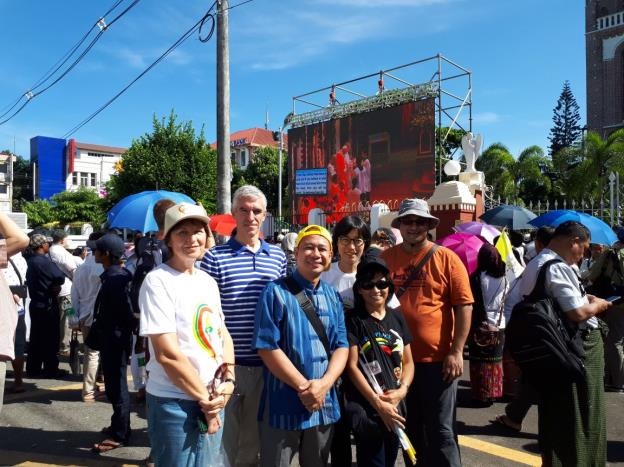
8 Dec 2017 | Focolare Worldwide
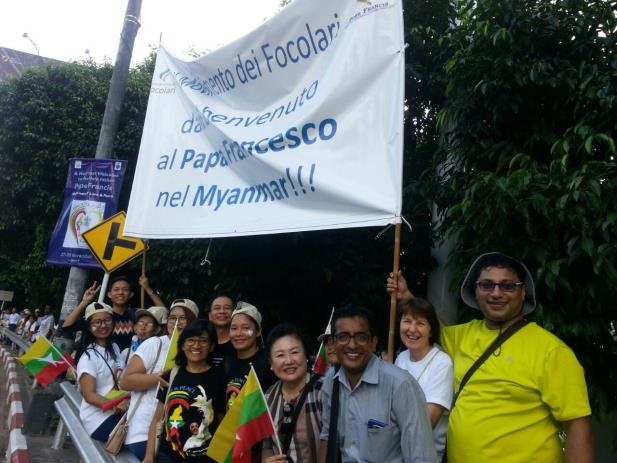 Peace, respect for the dignity of every people, and dialogue were some of the lofty goals left by Pope Francis to the populations he visited during his recent trip in Asia. Testimonies from the Focolare community have begun to arrive from Myanmar in recent days where, together with others, they were involved in taking care of different aspects of the trip – things like translations, maintaining order, health care, and the orchestra. Here are a few of the reports: “Pope Francis’s coming was a dream come true for us. It took a while for the amazement to become conscious awareness of what was really happening.” “The tears streamed down the cheeks of the elderly. But also the youth, for whom it was more difficult to grasp what was taking place, were overjoyed.” The small minority of Catholics in the country felt encouraged: “We were a little flock and isolated. Finally we saw our shepherd up close. These people are no longer on the margins, but under the world spotlight. Finally something happened to be proud of. The Pope is in Myanmar.” “We don’t have to be afraid of anything anymore.”
Peace, respect for the dignity of every people, and dialogue were some of the lofty goals left by Pope Francis to the populations he visited during his recent trip in Asia. Testimonies from the Focolare community have begun to arrive from Myanmar in recent days where, together with others, they were involved in taking care of different aspects of the trip – things like translations, maintaining order, health care, and the orchestra. Here are a few of the reports: “Pope Francis’s coming was a dream come true for us. It took a while for the amazement to become conscious awareness of what was really happening.” “The tears streamed down the cheeks of the elderly. But also the youth, for whom it was more difficult to grasp what was taking place, were overjoyed.” The small minority of Catholics in the country felt encouraged: “We were a little flock and isolated. Finally we saw our shepherd up close. These people are no longer on the margins, but under the world spotlight. Finally something happened to be proud of. The Pope is in Myanmar.” “We don’t have to be afraid of anything anymore.” 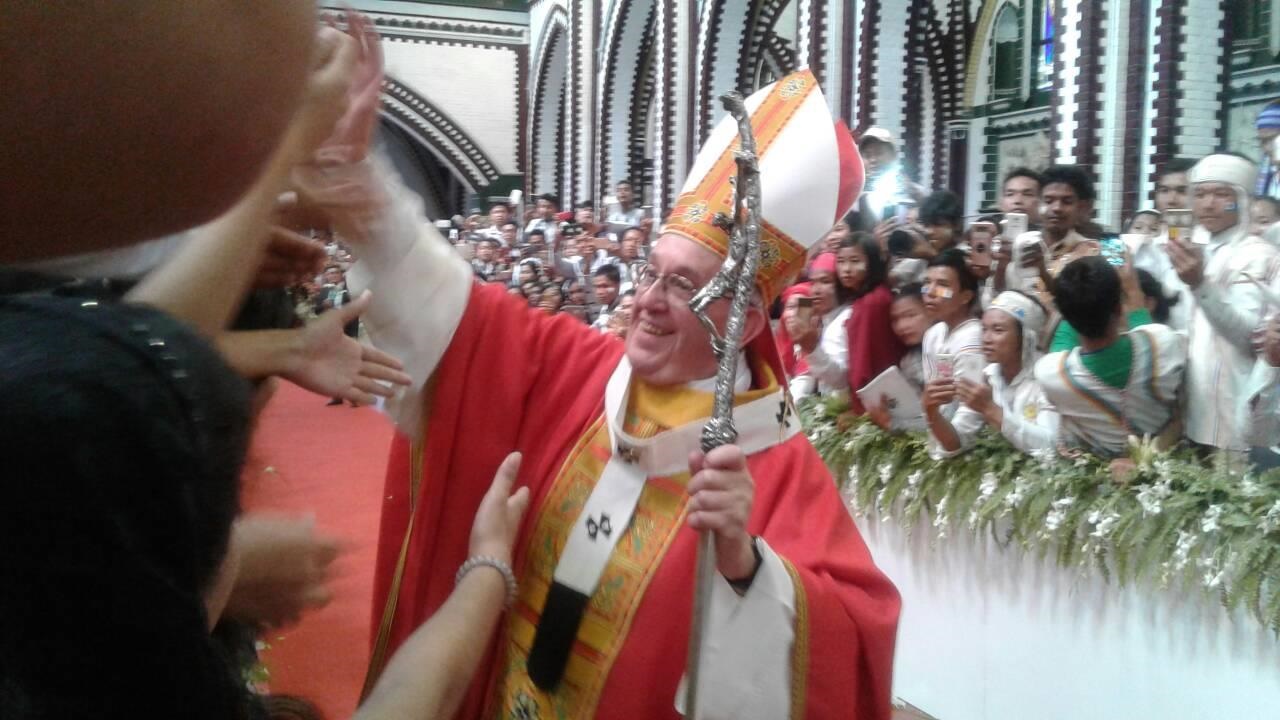 Gennie works with Internally Displaced Persons (IDP), civilians who are forced to escape persecutions and, unlike refugees, haven’t crossed international borders. In the majority of cases, while waiting for a new life, they’re deprived of help and protection. After Pope Francis’s visit, she writes: “Today this hope is renewed. “My own personal hope is in Love, and from now on it will be more and more alive in me.” “On November 28 we left with a group of a hundred people from the farthest villages of the country. We travelled in at least five buses. “The trip was organized by our parish. Seeing the Pope was like a dream for us. We left at nine o’clock in the morning and travelled for ten hours. We were full of enthusiasm, we prayed and sang. We took a short-cut, but it took all of us around twenty hours to get there because we didn’t want to let our friends fall behind and be on their own. But nobody complained about that.”
Gennie works with Internally Displaced Persons (IDP), civilians who are forced to escape persecutions and, unlike refugees, haven’t crossed international borders. In the majority of cases, while waiting for a new life, they’re deprived of help and protection. After Pope Francis’s visit, she writes: “Today this hope is renewed. “My own personal hope is in Love, and from now on it will be more and more alive in me.” “On November 28 we left with a group of a hundred people from the farthest villages of the country. We travelled in at least five buses. “The trip was organized by our parish. Seeing the Pope was like a dream for us. We left at nine o’clock in the morning and travelled for ten hours. We were full of enthusiasm, we prayed and sang. We took a short-cut, but it took all of us around twenty hours to get there because we didn’t want to let our friends fall behind and be on their own. But nobody complained about that.” 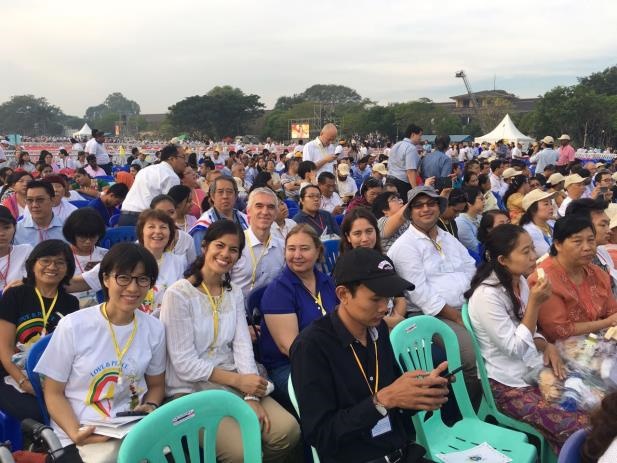 The group reached Kyaikkasan Ground of Yangon at around 5:30 in the morning as Mass was about to begin. It was attended not only by the small Catholic minority, but also by Muslims, Buddhists and faithful of different religions. “Our group couldn’t get in, but we found a spot near one of the entrances. Through the Pope we were able to feel the Church’s love for the smallest flock. You could sense a very strong love also among the whole population, not only among the Christians. Our taxi driver told us that he had been driving people for free to the stadium since early morning, and that the public trains were doing the same.” One Buddhist youth, who had just attended the Mass, wrote: “Here too I felt I was in a family. I notice a deep peace in my heart.”
The group reached Kyaikkasan Ground of Yangon at around 5:30 in the morning as Mass was about to begin. It was attended not only by the small Catholic minority, but also by Muslims, Buddhists and faithful of different religions. “Our group couldn’t get in, but we found a spot near one of the entrances. Through the Pope we were able to feel the Church’s love for the smallest flock. You could sense a very strong love also among the whole population, not only among the Christians. Our taxi driver told us that he had been driving people for free to the stadium since early morning, and that the public trains were doing the same.” One Buddhist youth, who had just attended the Mass, wrote: “Here too I felt I was in a family. I notice a deep peace in my heart.”  Gennie continues: “The new criteria that should be observed from now on are totally topsy turvey and new: the VIPs are all there in the Magnificat . . . He has raised up the lowly . . . filled the hungry with good things.” “We have to thank everyone for this experience – the Yangonians, who were always so patient with the crowd; the people who prepared the event, but especially Pope Francis who made the decision to come to such a far-away land. It’s a new daybreak for Myanmar.” Valentina is a medical doctor. She and other doctors lent their services to help with the health care. “It was an occasion that put us together, without borders. We Catholic and non-Catholic doctors worked straight through and were very tired, but we received a sort of grace, that of being able to love without stopping.” Jerome worked as a translator: “For me it was especially beautiful to see the youth waiting from early in the morning at the Cathedral of St Mary in Yangon. At the end of the Mass the Pope turned to us with lots of encouragement for us to work or peace. I now feel called to greater generosity, to be joyful and brave as he asked us to be.”
Gennie continues: “The new criteria that should be observed from now on are totally topsy turvey and new: the VIPs are all there in the Magnificat . . . He has raised up the lowly . . . filled the hungry with good things.” “We have to thank everyone for this experience – the Yangonians, who were always so patient with the crowd; the people who prepared the event, but especially Pope Francis who made the decision to come to such a far-away land. It’s a new daybreak for Myanmar.” Valentina is a medical doctor. She and other doctors lent their services to help with the health care. “It was an occasion that put us together, without borders. We Catholic and non-Catholic doctors worked straight through and were very tired, but we received a sort of grace, that of being able to love without stopping.” Jerome worked as a translator: “For me it was especially beautiful to see the youth waiting from early in the morning at the Cathedral of St Mary in Yangon. At the end of the Mass the Pope turned to us with lots of encouragement for us to work or peace. I now feel called to greater generosity, to be joyful and brave as he asked us to be.”
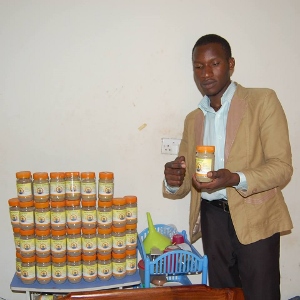
4 Dec 2017 | Focolare Worldwide
 Masaka, Kampala, Entebbe and great Lake Victoria – this is the wide territory that Henry has covered in his country, Uganda, the “pearl of Africa.” He’s gone from the village where he was born, to his economic studies at university in the capitol, to the shores of the largest lake on the continent. It is so large that it counts more than 3,000 islands. This is where the White Nile begins, which then flows into the longest river in Africa, the Nile. Everything is big in Uganda: the parks, the impenetrable forests, the nature reserves. Henry dreams big too. “At Masaka, where I went to university, I noticed how people didn’t have time to cook anymore,” he says. To resolve the problem, Henry started a business to produce meat and fish products. At just 24, together with two others his age, he started the Sseruh Food Processing Company Ltd. in Entebbe. On the other side of the world, in Argentina, another entrepreneur, Gonzalo Perrin, had already started a company some years ago: Pasticcino, which produces cookies for a number of cafeteria chains and coffee roasters. Urged on by the spirit of the Economy of Communion, Perrin moved to the Soladaridad industrial park at Mariapolis Lia, a little city of the Focolare. There he promotes a culture marked by the values of reciprocity, care for the disadvantaged and the environment.
Masaka, Kampala, Entebbe and great Lake Victoria – this is the wide territory that Henry has covered in his country, Uganda, the “pearl of Africa.” He’s gone from the village where he was born, to his economic studies at university in the capitol, to the shores of the largest lake on the continent. It is so large that it counts more than 3,000 islands. This is where the White Nile begins, which then flows into the longest river in Africa, the Nile. Everything is big in Uganda: the parks, the impenetrable forests, the nature reserves. Henry dreams big too. “At Masaka, where I went to university, I noticed how people didn’t have time to cook anymore,” he says. To resolve the problem, Henry started a business to produce meat and fish products. At just 24, together with two others his age, he started the Sseruh Food Processing Company Ltd. in Entebbe. On the other side of the world, in Argentina, another entrepreneur, Gonzalo Perrin, had already started a company some years ago: Pasticcino, which produces cookies for a number of cafeteria chains and coffee roasters. Urged on by the spirit of the Economy of Communion, Perrin moved to the Soladaridad industrial park at Mariapolis Lia, a little city of the Focolare. There he promotes a culture marked by the values of reciprocity, care for the disadvantaged and the environment.
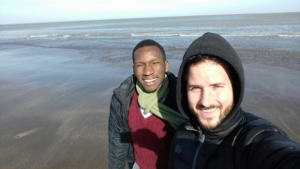
Henry Sserugo and Gonzalo Perrin

Henry shows the fish products of the Sseruh Food Processing Company Ltd
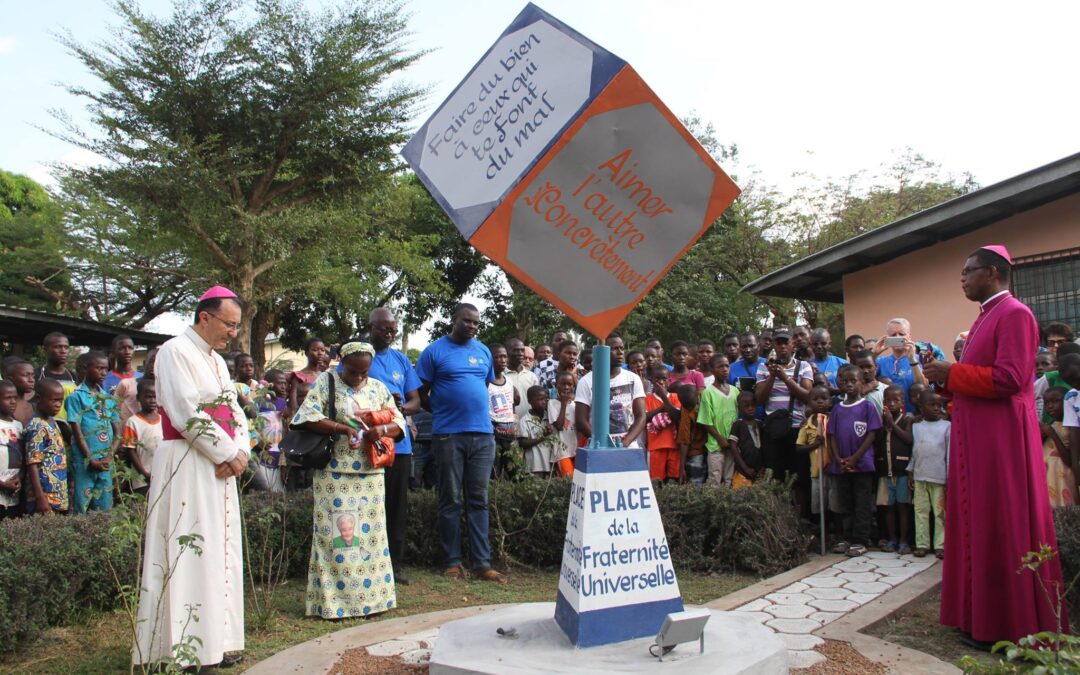
30 Nov 2017 | Focolare Worldwide
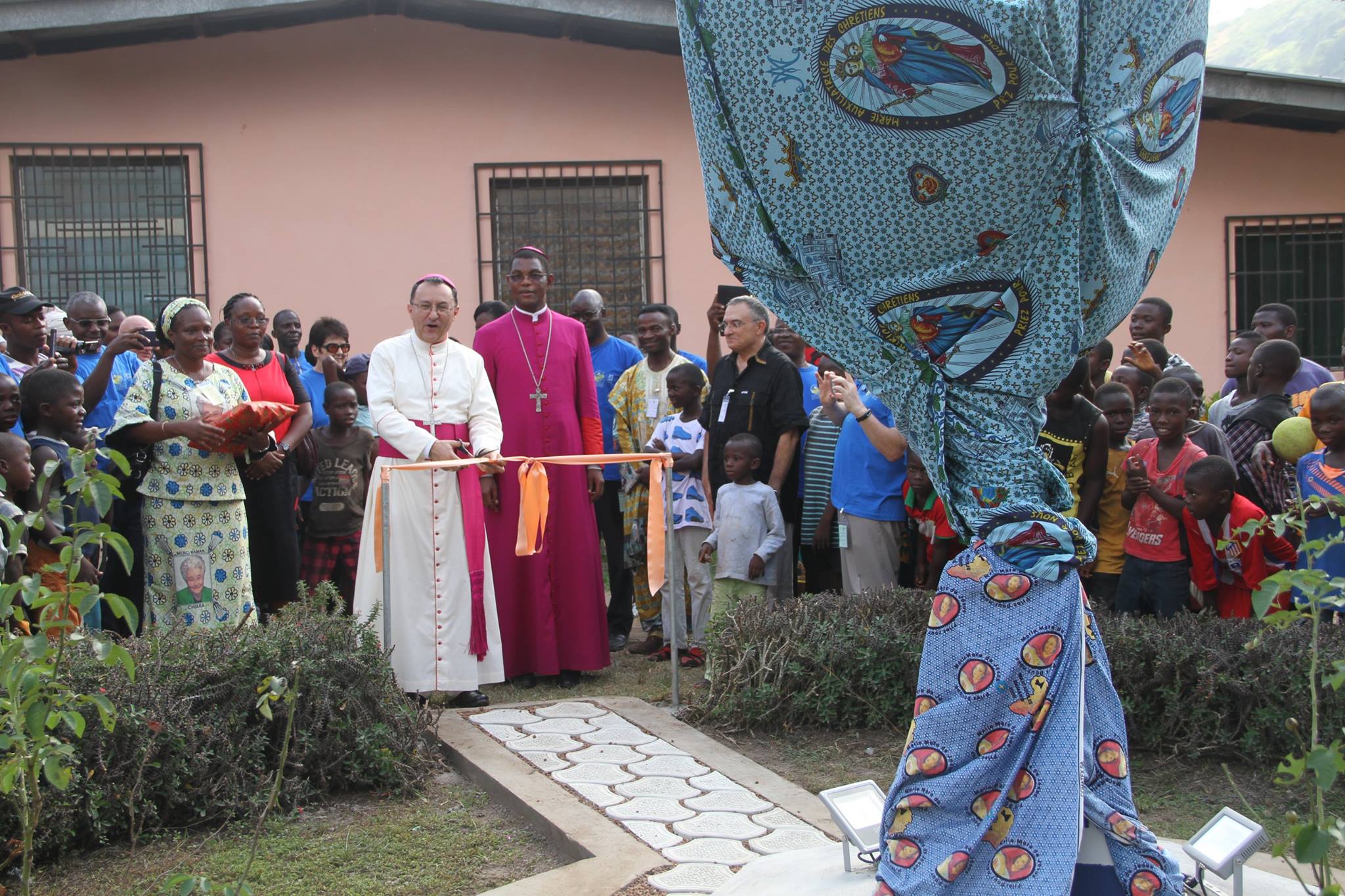 The blessing of Pope Francis unexpectedly reaches the citizens of Mariapolis Victoria, a small oasis of peace in the city of Man, Ivory Coast as it celebrates its Silver Anniversary. It arrived with a thank you for the work of evangelisation that has been carried out in that place.” Francis invited them to “persevere with courage in the service of unity and concord among people,” and to continue “along the path of an ever-more universal fraternity. This place is dotted with episodes of fraternity, beginning from the civil war of 2002-2003 when the locals decided to stay. Also the European focolarini, even though the local authorities urged foreigners to leave the country. It was a witness of loving their own to the end, of opening their doors to protect people, and 3,500 Muslims and Christians passed through those doors in those months. These were people who risked their lives, like Salvatore, Rino, Charles, put against the wall, ready to be shot: “All you can do now is pray!” they told them. But they managed to pull it off. Now the city and the country has turned the page, even if there isn’t complete political reconcilliation.
The blessing of Pope Francis unexpectedly reaches the citizens of Mariapolis Victoria, a small oasis of peace in the city of Man, Ivory Coast as it celebrates its Silver Anniversary. It arrived with a thank you for the work of evangelisation that has been carried out in that place.” Francis invited them to “persevere with courage in the service of unity and concord among people,” and to continue “along the path of an ever-more universal fraternity. This place is dotted with episodes of fraternity, beginning from the civil war of 2002-2003 when the locals decided to stay. Also the European focolarini, even though the local authorities urged foreigners to leave the country. It was a witness of loving their own to the end, of opening their doors to protect people, and 3,500 Muslims and Christians passed through those doors in those months. These were people who risked their lives, like Salvatore, Rino, Charles, put against the wall, ready to be shot: “All you can do now is pray!” they told them. But they managed to pull it off. Now the city and the country has turned the page, even if there isn’t complete political reconcilliation. 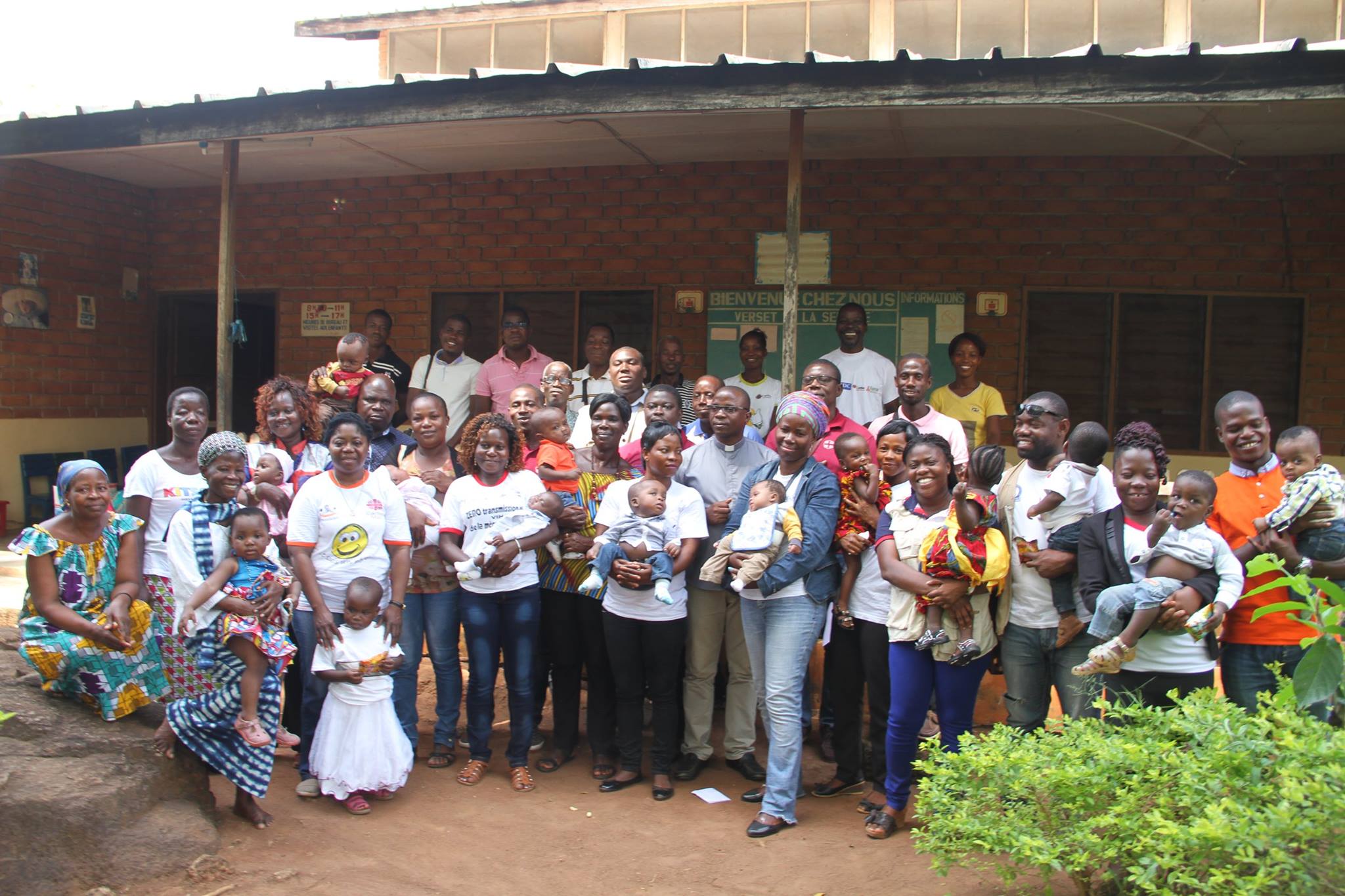 But Mariapolis Victoria is not only an oasis of peace in times of war. It is a social laboratory. During the three-day celebration in honour of the 25th anniversary, the focus was on facts and deeds. Visits to the activities of the town were on top of the schedule: the Medical Social Centre – renovated and enlarged, with emergency services and impatient hospital, a dental clinic, a physiotherapist – the nutrition centre where the wounds of infant malnutrition are cured, and mothers are taught nutritional care; the computer centre and more and more specialized courses – along with other entrepreneurial activities like carpentry and printing. A football tournament was held during the preparations for the 25th anniversary in the name of fraternity and fair play. On Sunday, November 19th the prizes were finally given to the winners, not only for the goals they gained, but also for the points they earned for fair play.
But Mariapolis Victoria is not only an oasis of peace in times of war. It is a social laboratory. During the three-day celebration in honour of the 25th anniversary, the focus was on facts and deeds. Visits to the activities of the town were on top of the schedule: the Medical Social Centre – renovated and enlarged, with emergency services and impatient hospital, a dental clinic, a physiotherapist – the nutrition centre where the wounds of infant malnutrition are cured, and mothers are taught nutritional care; the computer centre and more and more specialized courses – along with other entrepreneurial activities like carpentry and printing. A football tournament was held during the preparations for the 25th anniversary in the name of fraternity and fair play. On Sunday, November 19th the prizes were finally given to the winners, not only for the goals they gained, but also for the points they earned for fair play. 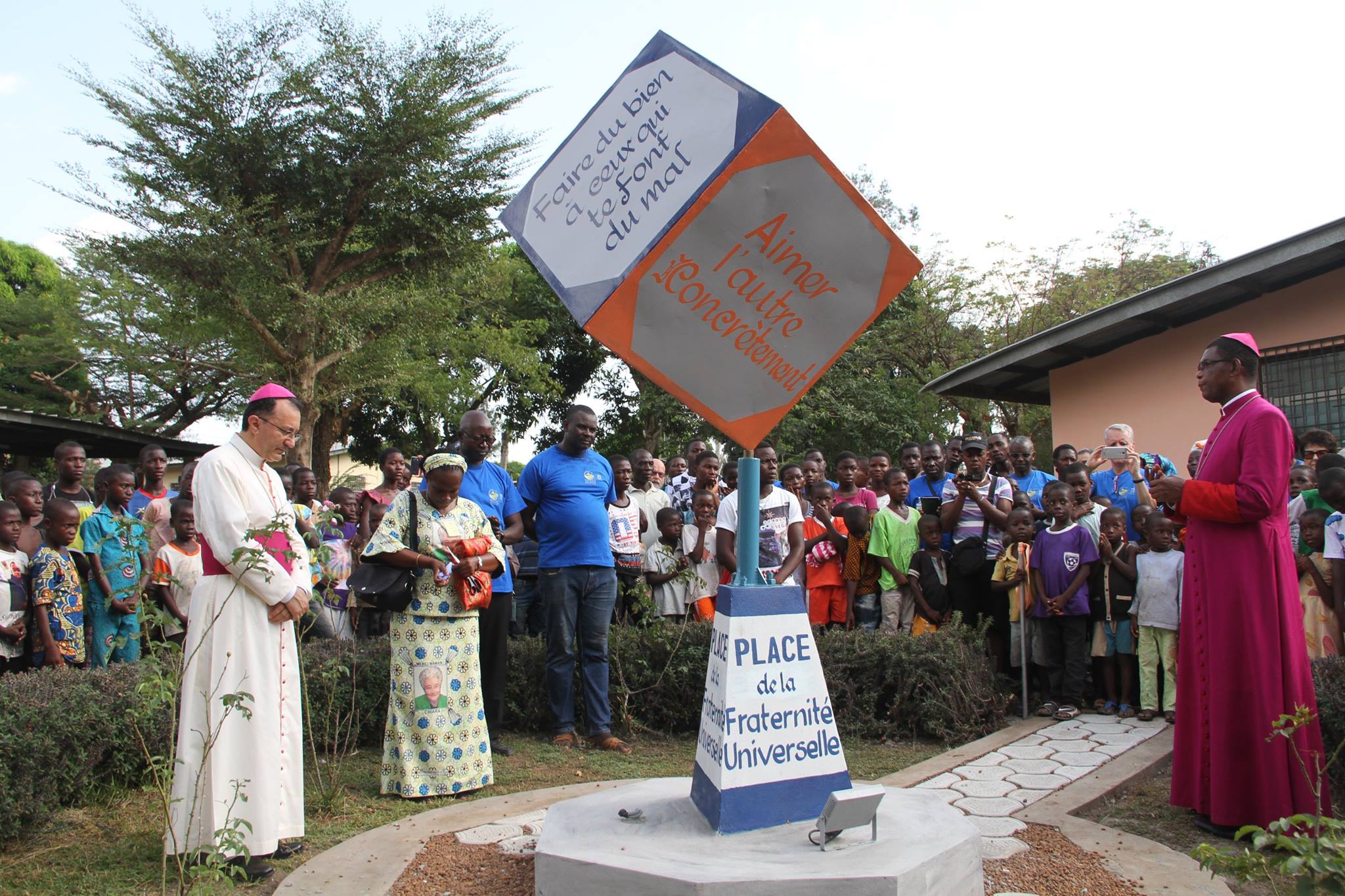 The placing of stele in “Universal Brotherhood Square was also quite symbolic, along with a large Cube of Peace that expresses the personal identity of the Mariapolis where love and respect for the other person tends to transfer onto every aspect of life in the little town. Official celebrations were also held at St Mary Queen of Africa Parish, which has been entrusted to the the Focolare Movement since 1970. Present with Apostolic Nunzio Joseph Spiteri and Bishop of Man, Gaspar Bebi Gneba, there were also numerous civil authorities: Vice-Prefect of Man, Madame Djerehe Claude and ex-Minister Mabri Toikeusse, who is also president of the regional chamber of the King of the Traditional Chiefs of the Tonpki, Gué Pascal. They expressed their recognition of the Ivorian authority for the help to people during the crisis and generally for the Focolare’s efforts in favour of the vulnerable populations. Also the Italian Ambassador, Stefano Lo Savio, wanted to attend and deliver a very warm message. Now we are looking ahead with three words to guide our steps: welcome, formation and attentiveness to the poor. Maria Chiara De Lorenzo
The placing of stele in “Universal Brotherhood Square was also quite symbolic, along with a large Cube of Peace that expresses the personal identity of the Mariapolis where love and respect for the other person tends to transfer onto every aspect of life in the little town. Official celebrations were also held at St Mary Queen of Africa Parish, which has been entrusted to the the Focolare Movement since 1970. Present with Apostolic Nunzio Joseph Spiteri and Bishop of Man, Gaspar Bebi Gneba, there were also numerous civil authorities: Vice-Prefect of Man, Madame Djerehe Claude and ex-Minister Mabri Toikeusse, who is also president of the regional chamber of the King of the Traditional Chiefs of the Tonpki, Gué Pascal. They expressed their recognition of the Ivorian authority for the help to people during the crisis and generally for the Focolare’s efforts in favour of the vulnerable populations. Also the Italian Ambassador, Stefano Lo Savio, wanted to attend and deliver a very warm message. Now we are looking ahead with three words to guide our steps: welcome, formation and attentiveness to the poor. Maria Chiara De Lorenzo
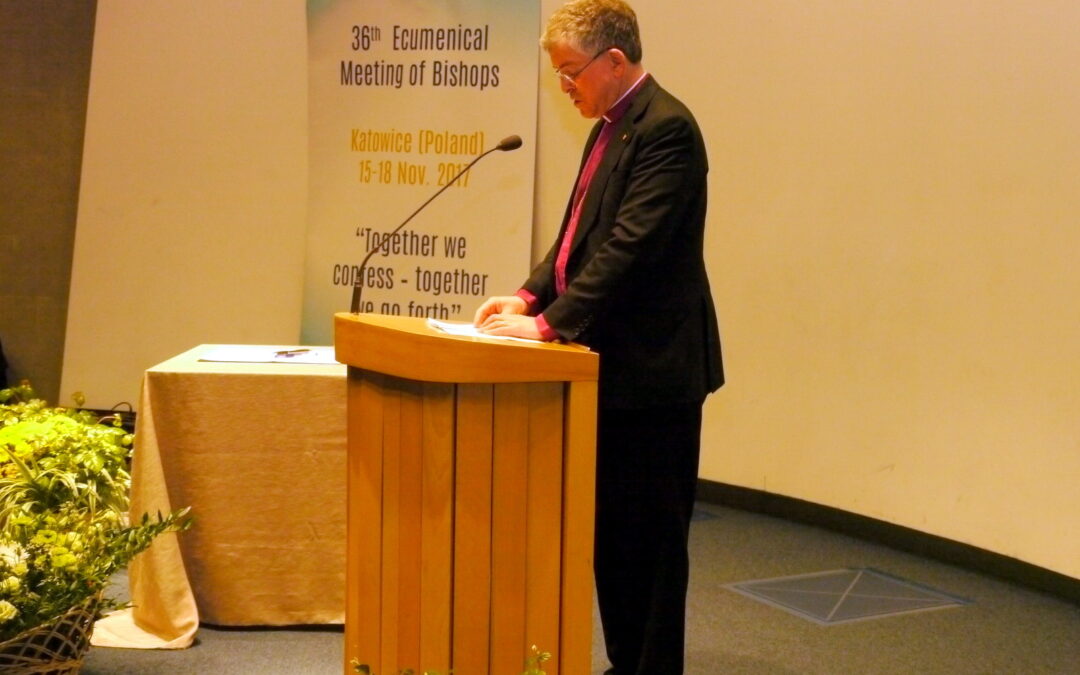
27 Nov 2017 | Focolare Worldwide
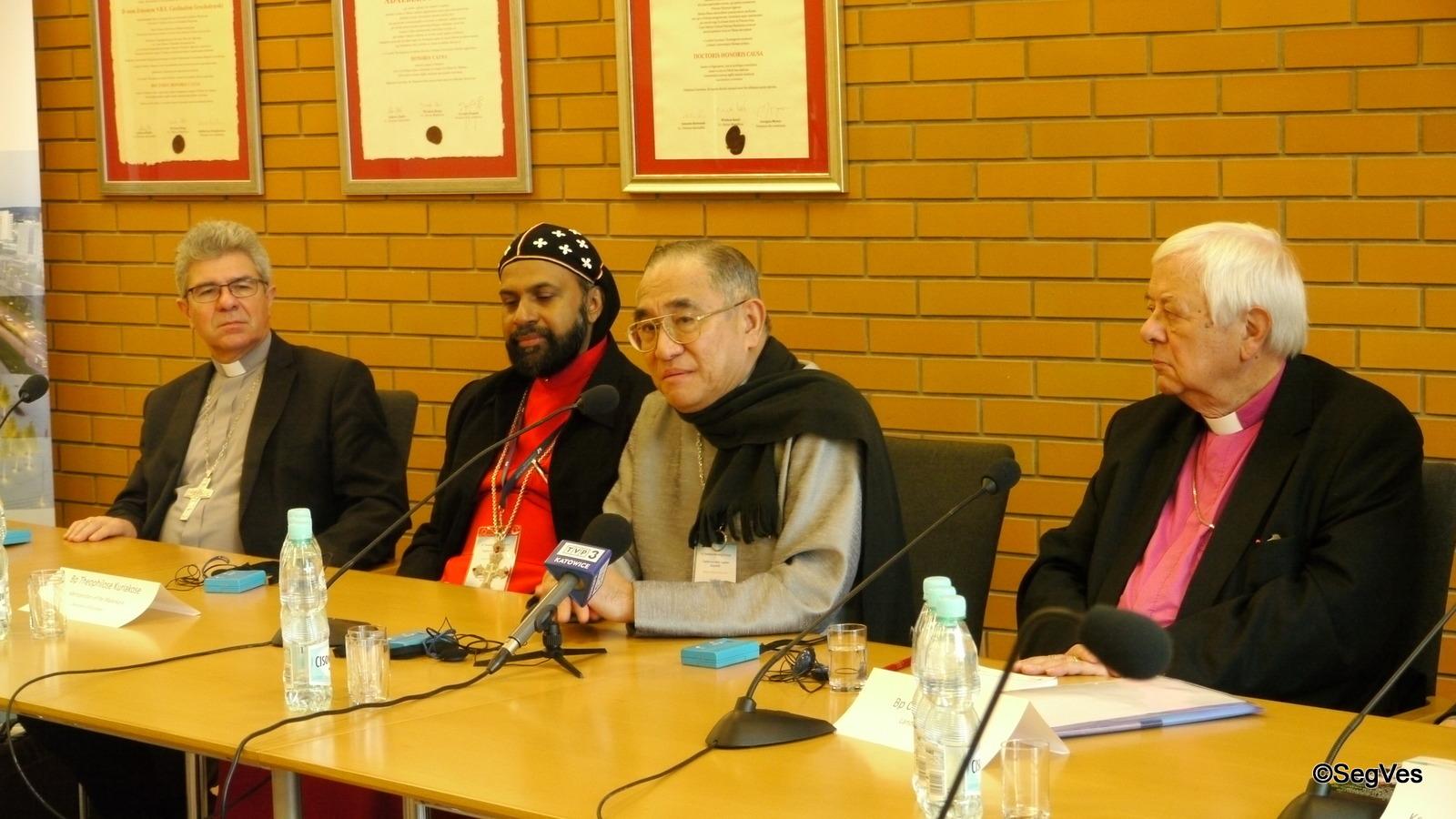 For the first time after 36 years, Poland was the host country of the annual ecumenical convention of the Bishop-friends of the Focolare Movement. After Jerusalem, Istanbul, London, Augsburg and other “symbolic” cities of the ecumenical commitment, Katowice, capital of Slesia, an ancient city of almost 300,000 inhabitant, welcomed, from 15 to 18 November, 35 bishops of different Churches: Orthodox, Syriac-Orthodox, Evangelical-Lutherans, Anglican, Methodists and Catholics from Germany, Austria, England, Ireland, Sweden, Poland, Hungary, Lithuania, Latvia, Czech Republic, but also Brazil, Cyprus, India, Democratic Republic of Congo, Thailand and the USA. Along with around thirty lay people the bishops gathered in Katowice represented a cross section of various social and ecclesial communities, driven by the desire to make an experience of fraternal communion. “Together we confess, together we go forth” was the title of the Convention, which was organized not only by the Focolare Movement, but also by the local Catholic Archdiocese and the Evangelical-Lutheran Church of Augustinian Confession, the Orthodox Church of Sosnowiec, the Faculty of Theology of the Slesia University and the city of Katowice itself, represented by mayor Marcin Krupa.
For the first time after 36 years, Poland was the host country of the annual ecumenical convention of the Bishop-friends of the Focolare Movement. After Jerusalem, Istanbul, London, Augsburg and other “symbolic” cities of the ecumenical commitment, Katowice, capital of Slesia, an ancient city of almost 300,000 inhabitant, welcomed, from 15 to 18 November, 35 bishops of different Churches: Orthodox, Syriac-Orthodox, Evangelical-Lutherans, Anglican, Methodists and Catholics from Germany, Austria, England, Ireland, Sweden, Poland, Hungary, Lithuania, Latvia, Czech Republic, but also Brazil, Cyprus, India, Democratic Republic of Congo, Thailand and the USA. Along with around thirty lay people the bishops gathered in Katowice represented a cross section of various social and ecclesial communities, driven by the desire to make an experience of fraternal communion. “Together we confess, together we go forth” was the title of the Convention, which was organized not only by the Focolare Movement, but also by the local Catholic Archdiocese and the Evangelical-Lutheran Church of Augustinian Confession, the Orthodox Church of Sosnowiec, the Faculty of Theology of the Slesia University and the city of Katowice itself, represented by mayor Marcin Krupa. 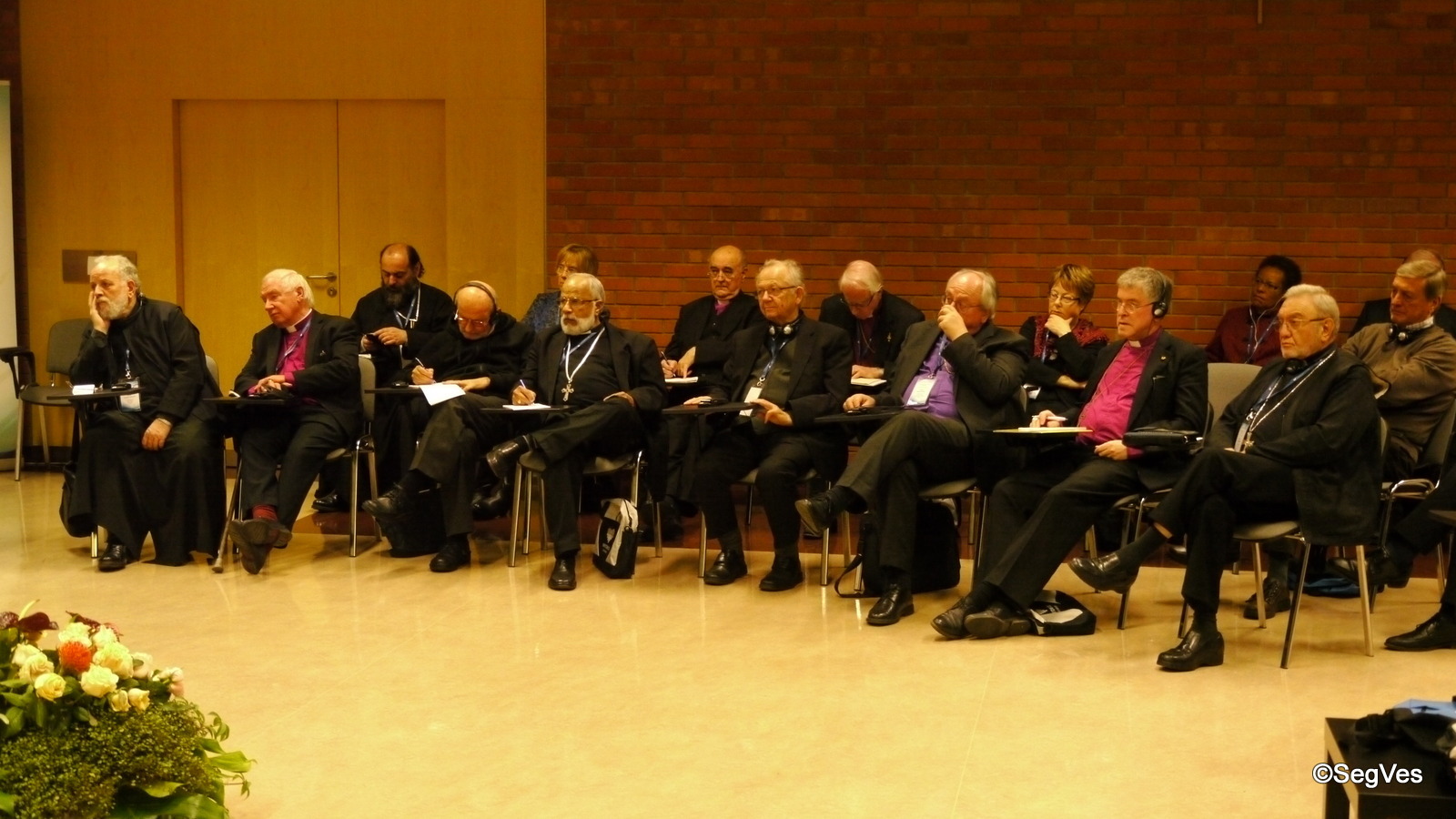 The convention opened with the reflection of Lesley Ellison, an Anglican, on “The Spirituality of unity: an ecumenical spirituality,” and had as its central theme “Mary, the Mother of Jesus,” with the theological studies in the various Catholic, Evangelic, Anglican and Orthodox perspectives. There were many encounters, celebrations and moments of prayer according to the various traditions, sealed by a “pact of mutual love” to live fraternal communion and to “love the Church of the other as one’s own Brendan Leahly is the Catholic bishop of Limerick (Irelanda), expert and counselor of ecumenical dialogue in his country. Interviewed on the phone, he said: “I want to underline the warm welcome received in Katowice, which I had already visited in 1991, on the occasion of Chiara Lubich’s encounter with the Focolare centers of Western and Eastern Europe. It is a highly developed city, which valorizes diversity and hospitality. Just as what we experienced in these days, the hospitality of the Faculty of Theology which hosted us, but also of the Catholic, Lutheran and Orthodox Churches.” The convention was the occasion to get to know one another better, and acquire a deeper knowledge of the different ecclesial and socio-cultural realities we live in, especially in the Middle East and Eastern Europe. We realize that we cannot offer solutions for the problems of those countries (especially regarding the Middle East), but we can at least carry one another’s burdens. Feeling the suffering of others has enlarged my heart. Now I no longer feel only like an Irish bishop, I carry within also the situations and problems of the other bishops. But with a new hope. In every country there are signs of hope, and the steps taken at ecumenical level go to prove this fact. For example in the Czech Republic a process of mutual forgiveness is underway for the errors committed. Ecumenism – he continued– is a reality that started its path many years ago, and will meet ever new situations and give new testimonials. It is, after all, an experience of giving and receiving. What strikes me is the strong Catholic faith which is deeply rooted here in Poland, but also the openness to dialogue with the representatives of the other communities.”
The convention opened with the reflection of Lesley Ellison, an Anglican, on “The Spirituality of unity: an ecumenical spirituality,” and had as its central theme “Mary, the Mother of Jesus,” with the theological studies in the various Catholic, Evangelic, Anglican and Orthodox perspectives. There were many encounters, celebrations and moments of prayer according to the various traditions, sealed by a “pact of mutual love” to live fraternal communion and to “love the Church of the other as one’s own Brendan Leahly is the Catholic bishop of Limerick (Irelanda), expert and counselor of ecumenical dialogue in his country. Interviewed on the phone, he said: “I want to underline the warm welcome received in Katowice, which I had already visited in 1991, on the occasion of Chiara Lubich’s encounter with the Focolare centers of Western and Eastern Europe. It is a highly developed city, which valorizes diversity and hospitality. Just as what we experienced in these days, the hospitality of the Faculty of Theology which hosted us, but also of the Catholic, Lutheran and Orthodox Churches.” The convention was the occasion to get to know one another better, and acquire a deeper knowledge of the different ecclesial and socio-cultural realities we live in, especially in the Middle East and Eastern Europe. We realize that we cannot offer solutions for the problems of those countries (especially regarding the Middle East), but we can at least carry one another’s burdens. Feeling the suffering of others has enlarged my heart. Now I no longer feel only like an Irish bishop, I carry within also the situations and problems of the other bishops. But with a new hope. In every country there are signs of hope, and the steps taken at ecumenical level go to prove this fact. For example in the Czech Republic a process of mutual forgiveness is underway for the errors committed. Ecumenism – he continued– is a reality that started its path many years ago, and will meet ever new situations and give new testimonials. It is, after all, an experience of giving and receiving. What strikes me is the strong Catholic faith which is deeply rooted here in Poland, but also the openness to dialogue with the representatives of the other communities.” 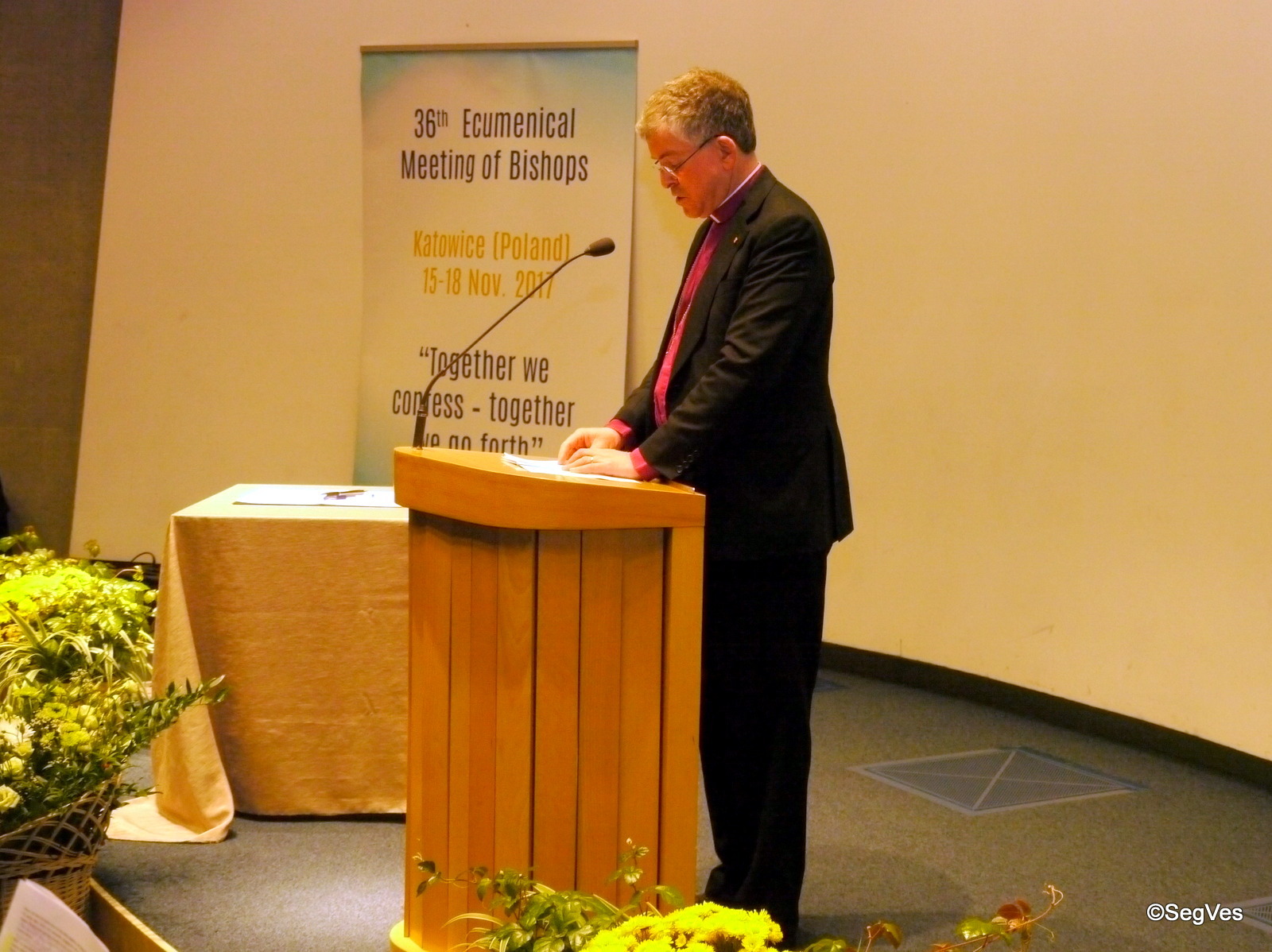 Åke Bonnier, Lutheran bishop of the diocese of Skara, in Sweden, said he was happy about the convention: «We were not bishops but brothers. What we shared in the convention was a reality, both during the breaks and intervals, and also during the celebrations. This was very important for me, it gave me new strength and enthusiasm. I now look forward to next year, when, I hope all of them and also others can come to Sweden. If they ask me if this meeting was important as a path for the unity of Christians, my answer is yes. Unity is not something that will come about only in the future, it is already a reality among us.”
Åke Bonnier, Lutheran bishop of the diocese of Skara, in Sweden, said he was happy about the convention: «We were not bishops but brothers. What we shared in the convention was a reality, both during the breaks and intervals, and also during the celebrations. This was very important for me, it gave me new strength and enthusiasm. I now look forward to next year, when, I hope all of them and also others can come to Sweden. If they ask me if this meeting was important as a path for the unity of Christians, my answer is yes. Unity is not something that will come about only in the future, it is already a reality among us.”
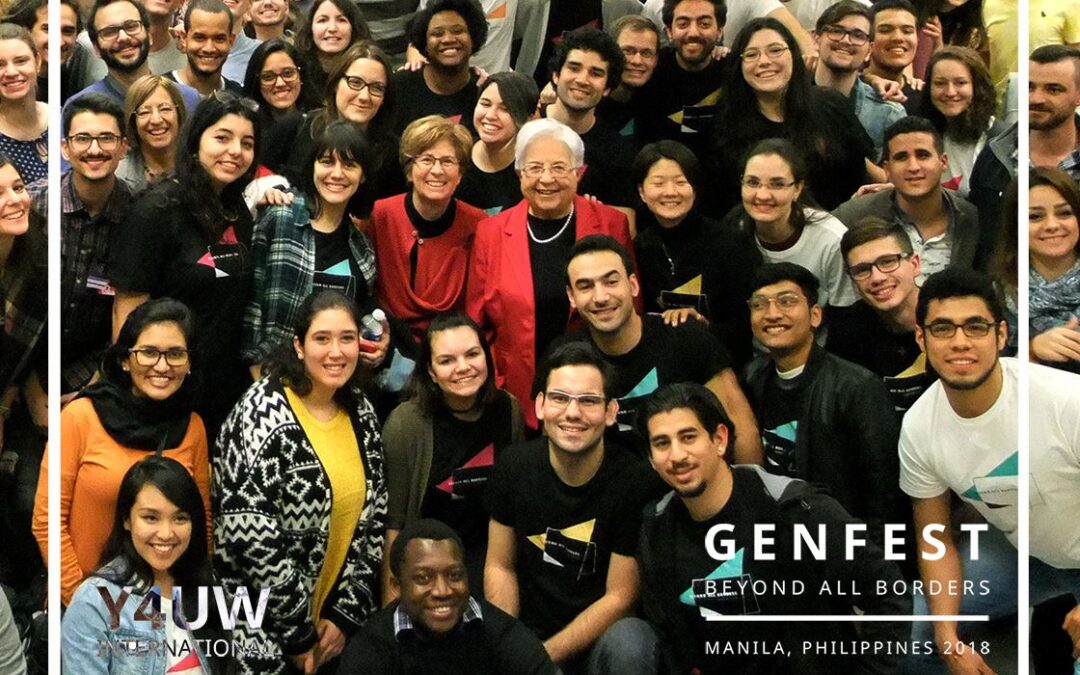
23 Nov 2017 | Focolare Worldwide
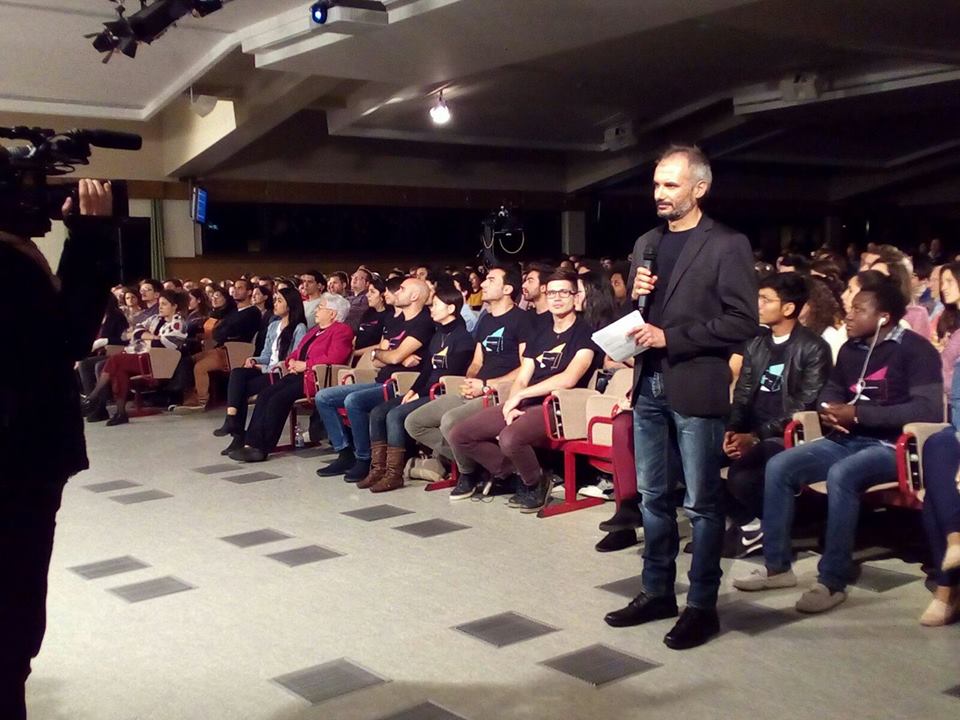
Paolo Balduzzi, TV journalist, presents the “Youth for a united World” during the live worldwide transmission.
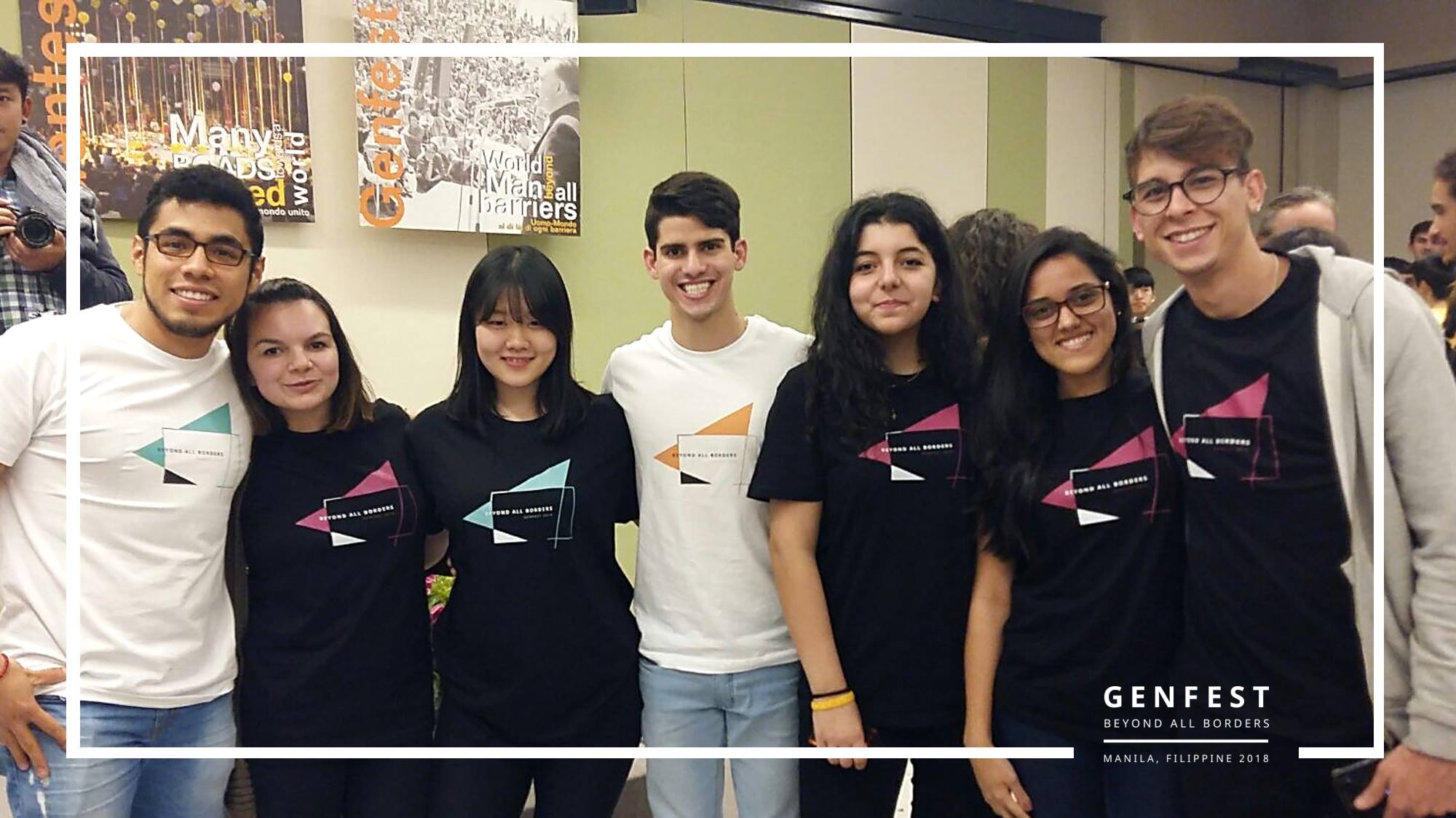 It’s that great idea that was launched by Chiara Lubich in 1987, the idea she bequeathed to the new generations. That year, the Focolare foundress stood in front of a vast crowd of young people and explained to them the reason for the Genfest: “An explosion of fires, not artificial fireworks, but real fires, the fire of God’s love. The goal of ut omnes (“Father, may they all be one” [Jn 17:20-23]) draws near. Jesus wins over and draws people along, leaving behind everything that doesn’t move, like a stream of fresh water that leaves to the sides all the things that can’t be carried ahead in its limpid waters.” Chiara added: “You’ll see the miracles of God’s grace, because God is with us, God is in our midst. He’s the only Powerful One.” Standing among the young people was the current president of the Focolare, Maria Voce. “I’d like to say a huge thank you to the young people.” They’ve made a great act of courage “which seems like the answer of today to the appeal Chiara has launched ever since 1960: ‘Young people of the world unite!’ This appeal still resounds right now, not only for you, but for everyone. The goal of a united world has not yet been reached. The first generation couldn’t do it alone. The second won’t do it alone either, because its purpose is so vast. The idea of a united world has to be passed on from one generation to the next, and all of them united together can hope to bring it to fulfilment.”
It’s that great idea that was launched by Chiara Lubich in 1987, the idea she bequeathed to the new generations. That year, the Focolare foundress stood in front of a vast crowd of young people and explained to them the reason for the Genfest: “An explosion of fires, not artificial fireworks, but real fires, the fire of God’s love. The goal of ut omnes (“Father, may they all be one” [Jn 17:20-23]) draws near. Jesus wins over and draws people along, leaving behind everything that doesn’t move, like a stream of fresh water that leaves to the sides all the things that can’t be carried ahead in its limpid waters.” Chiara added: “You’ll see the miracles of God’s grace, because God is with us, God is in our midst. He’s the only Powerful One.” Standing among the young people was the current president of the Focolare, Maria Voce. “I’d like to say a huge thank you to the young people.” They’ve made a great act of courage “which seems like the answer of today to the appeal Chiara has launched ever since 1960: ‘Young people of the world unite!’ This appeal still resounds right now, not only for you, but for everyone. The goal of a united world has not yet been reached. The first generation couldn’t do it alone. The second won’t do it alone either, because its purpose is so vast. The idea of a united world has to be passed on from one generation to the next, and all of them united together can hope to bring it to fulfilment.” 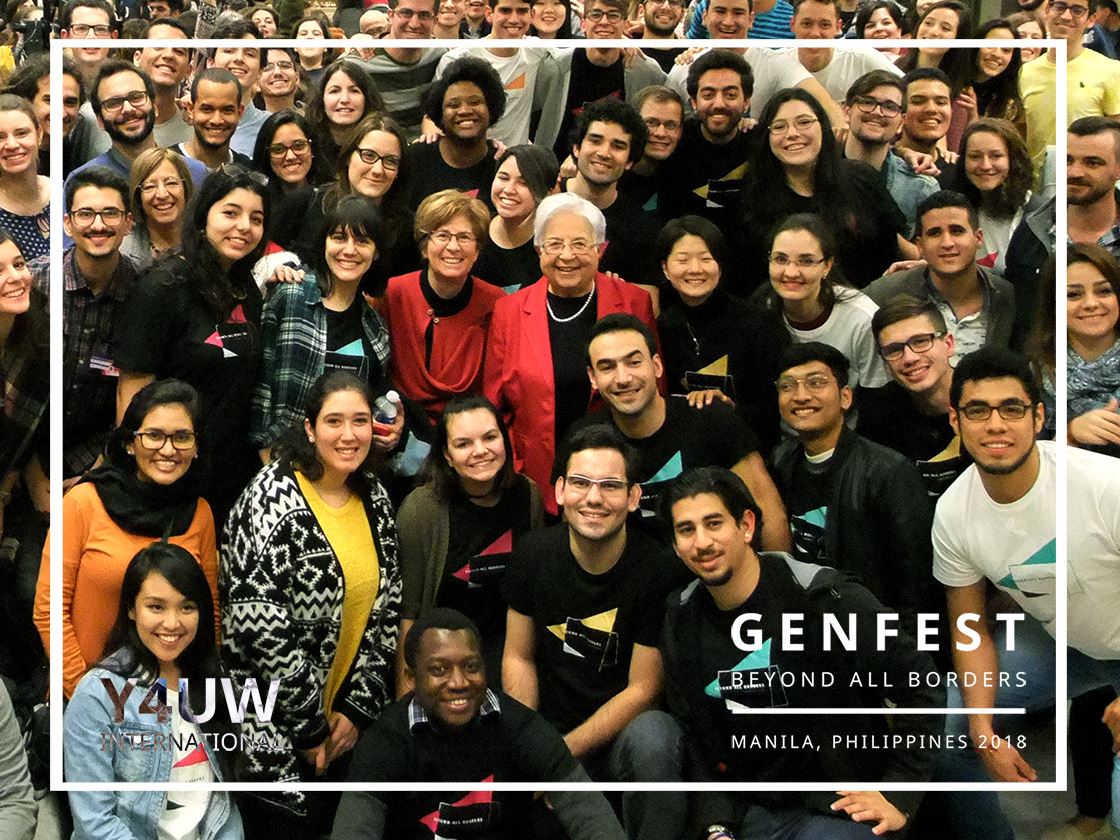 She went on to say: “The Genfest isn’t something that only regards the young, but everyone. That’s why I want to go, and I hope there will be many of us.” Everyone can do something. “Some may say: but I’m sick, I can’t… Offer your pain! Let’s all of us step up. You can help by offering hospitality; you can help the young people to prepare their programmes; you can give financial support for the young people who otherwise wouldn’t be able to attend. Let’s do all we can, whatever it takes. The Genfest is mine, it’s ours!” Before signing off, young person from the Philippines leaves everyone with a triple task: “First: organize a local Genfest. Second: do a concrete project to help at least one young person go to Manila. Third: Buy the T-shirt with our logo.” Find all the details at: Youth for a United World website, and remember this acronym Y4UW. See also: www.focolare.org/en/genfest-2018/
She went on to say: “The Genfest isn’t something that only regards the young, but everyone. That’s why I want to go, and I hope there will be many of us.” Everyone can do something. “Some may say: but I’m sick, I can’t… Offer your pain! Let’s all of us step up. You can help by offering hospitality; you can help the young people to prepare their programmes; you can give financial support for the young people who otherwise wouldn’t be able to attend. Let’s do all we can, whatever it takes. The Genfest is mine, it’s ours!” Before signing off, young person from the Philippines leaves everyone with a triple task: “First: organize a local Genfest. Second: do a concrete project to help at least one young person go to Manila. Third: Buy the T-shirt with our logo.” Find all the details at: Youth for a United World website, and remember this acronym Y4UW. See also: www.focolare.org/en/genfest-2018/
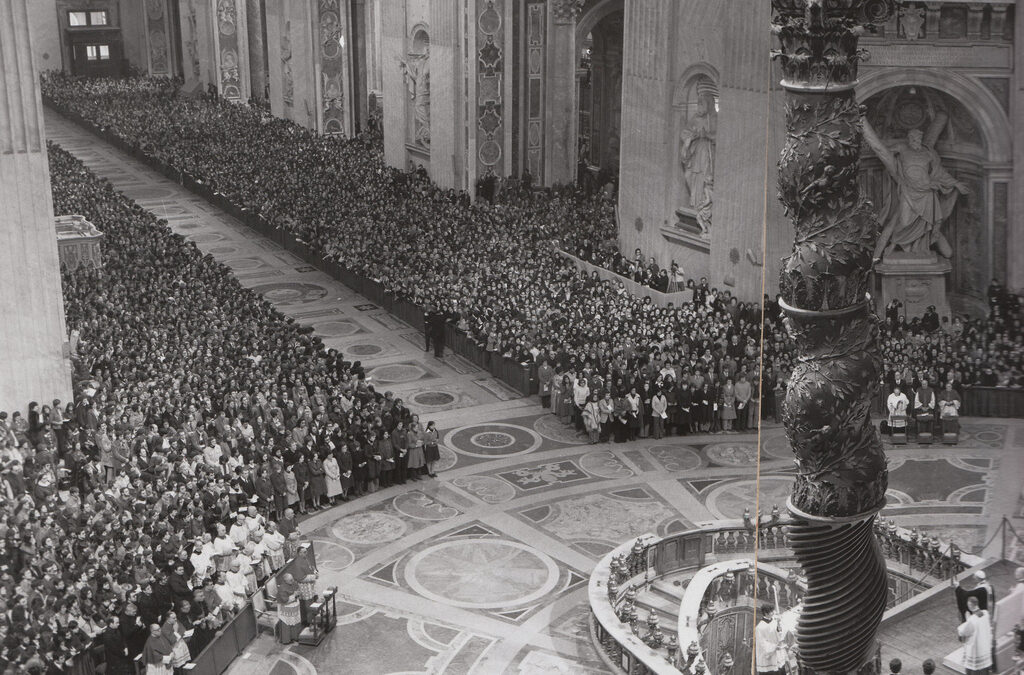
20 Nov 2017 | Focolare Worldwide
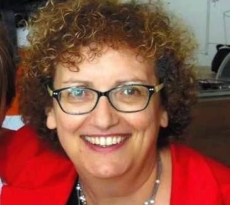
Patrizia Mazzola
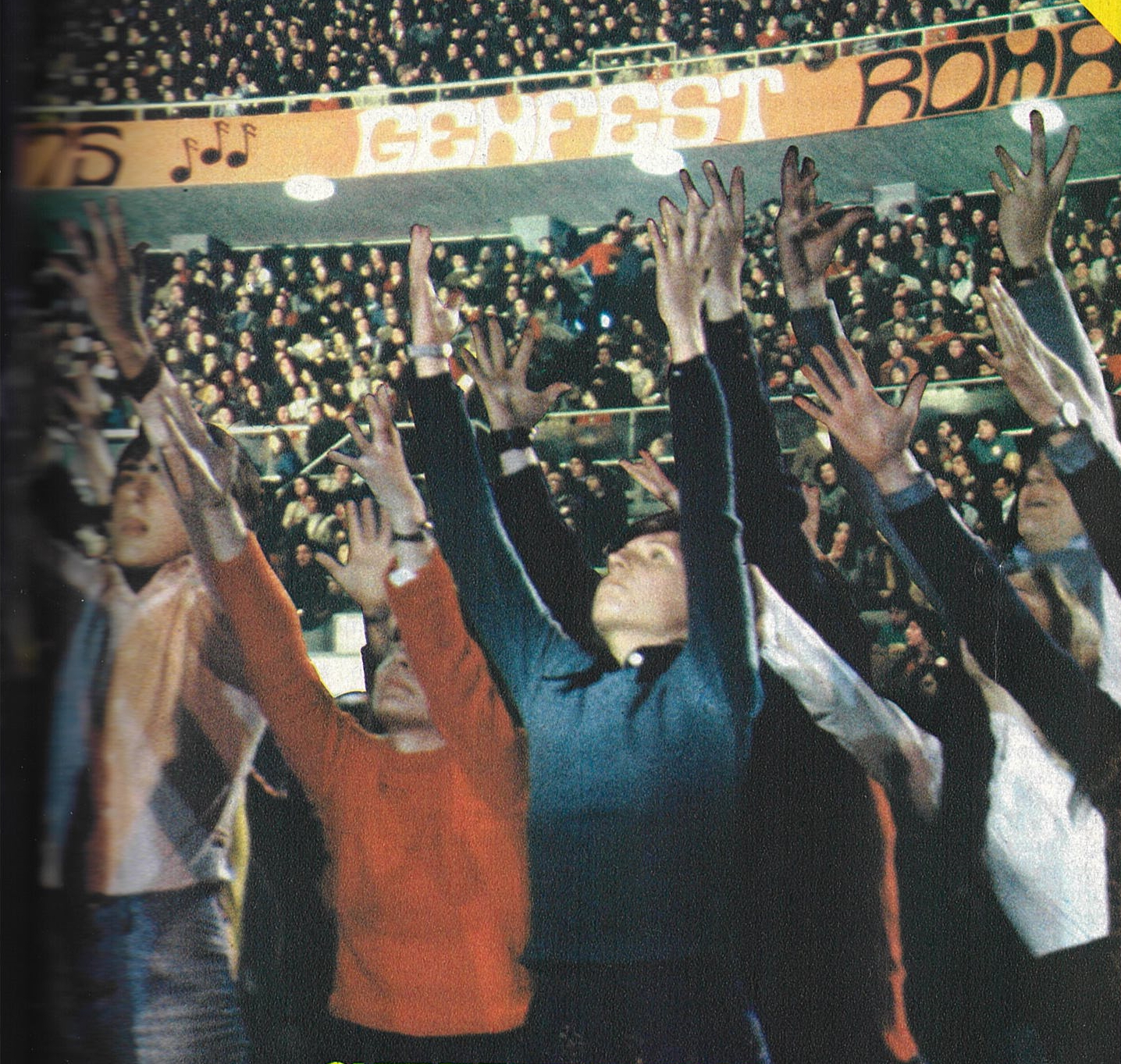 y background was in the Scouts, so I couldn’t believe that I could take part in this new experience. The invitation was extended to many other students at my school, and finally, together with my sisters, we made up our minds to attend, even though I remember that at the last minute I was tempted to stay back as I had to undertake an exam. The others encouraged me to go and so we left Palermo on a number of buses. With me I took my inseparable guitar, songbooks and tape-recorder, which at that time was rather cumbersome. During the trip, I was favourably impressed by some of the girls, the Gen, who were already living the spirituality of unity. I was struck by their attitude, the attention they were giving to everyone, the climate of harmony and serenity that they created among us, despite our exuberance, the moments of reflection that followed when we listened to the songs of Gen Rosso and Gen Verde, which I learnt to play straightaway with great enthusiasm
y background was in the Scouts, so I couldn’t believe that I could take part in this new experience. The invitation was extended to many other students at my school, and finally, together with my sisters, we made up our minds to attend, even though I remember that at the last minute I was tempted to stay back as I had to undertake an exam. The others encouraged me to go and so we left Palermo on a number of buses. With me I took my inseparable guitar, songbooks and tape-recorder, which at that time was rather cumbersome. During the trip, I was favourably impressed by some of the girls, the Gen, who were already living the spirituality of unity. I was struck by their attitude, the attention they were giving to everyone, the climate of harmony and serenity that they created among us, despite our exuberance, the moments of reflection that followed when we listened to the songs of Gen Rosso and Gen Verde, which I learnt to play straightaway with great enthusiasm 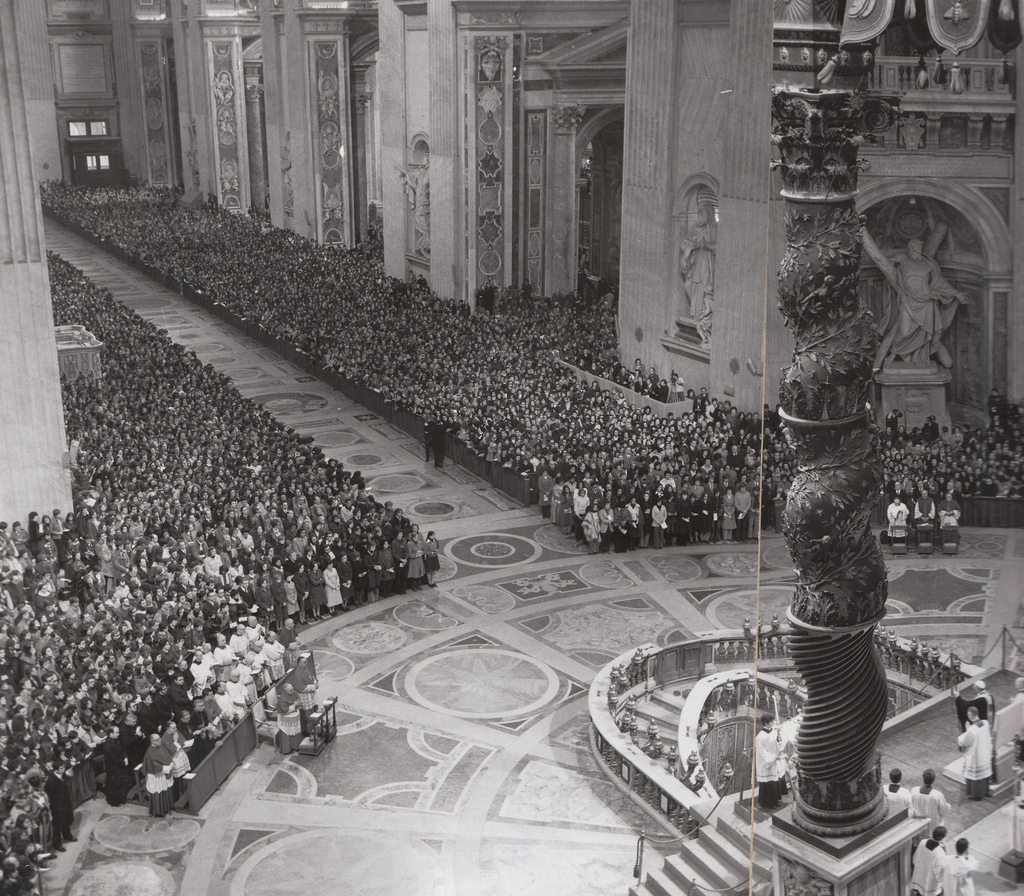 It was March 1st, 1975. The Sports Palace in Rome which had gathered 20,000 young people from five continents, made a powerful impact on me. I immediately experienced the power of the Gospel when it is lived. For example, it was the first time that I found myself sharing deeply with someone who was sitting next to me, thus having the experience of living as brothers and sisters. My dream, to see a world of peace, a united world, came true, right there. I was amazed and awestruck by the personal testimonies so much so that I almost had to pinch myself to believe that all this was happening. I listened attentively as they shared their stories from the stage: the two young people from South Africa where apartheid had not yet been defeated, the group from Belfast where there was conflict due to religious and political division. They were tangible signs that, if we really commit ourselves, we can achieve peace there where we live.
It was March 1st, 1975. The Sports Palace in Rome which had gathered 20,000 young people from five continents, made a powerful impact on me. I immediately experienced the power of the Gospel when it is lived. For example, it was the first time that I found myself sharing deeply with someone who was sitting next to me, thus having the experience of living as brothers and sisters. My dream, to see a world of peace, a united world, came true, right there. I was amazed and awestruck by the personal testimonies so much so that I almost had to pinch myself to believe that all this was happening. I listened attentively as they shared their stories from the stage: the two young people from South Africa where apartheid had not yet been defeated, the group from Belfast where there was conflict due to religious and political division. They were tangible signs that, if we really commit ourselves, we can achieve peace there where we live.
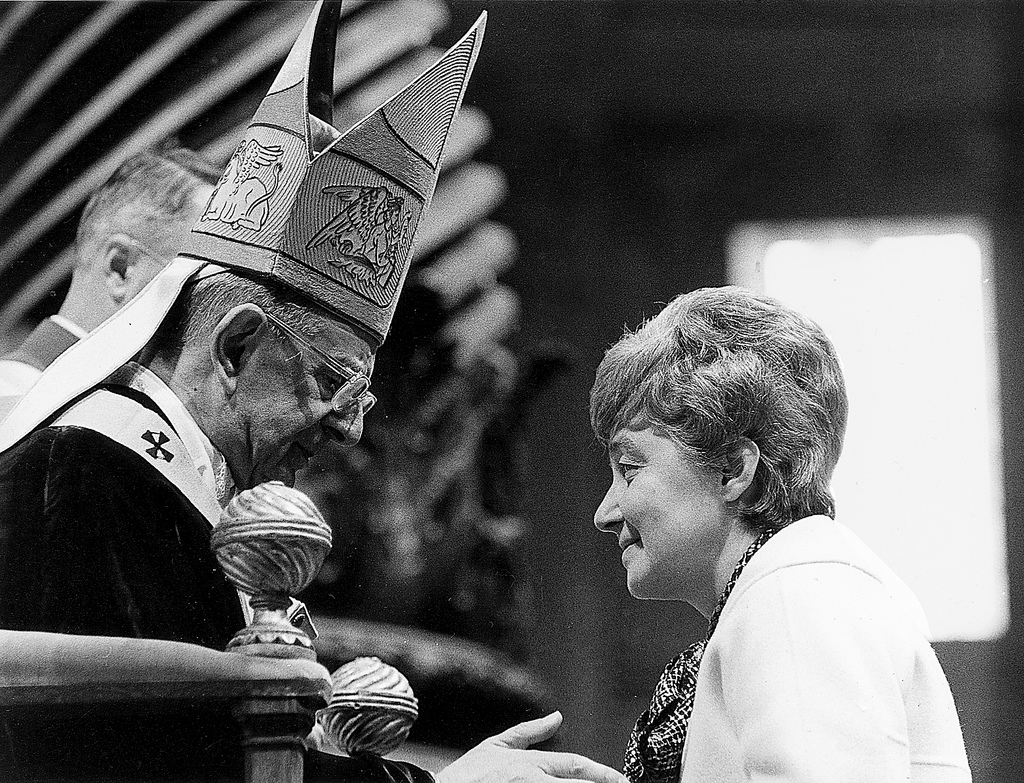 The next day, we all gathered at the Vatican, in St Peter’s Basilica, where Chiara Lubich presented us to the Holy Father. During the offertory, twelve young people, representing us, walked up with Chiara on the altar. I remember there was an endless applause. Consequently, during the Angelus (midday prayer) in St Peter’s Square, the Pope greeted us with words encouraging us to go on: “This morning, around the altar, we had twenty thousand faithful, the young Gen – New Generation – who came from all over the world. The beauty of it was something moving. We thank God and take courage. A new world is born: the Christian world of faith and charity.”
The next day, we all gathered at the Vatican, in St Peter’s Basilica, where Chiara Lubich presented us to the Holy Father. During the offertory, twelve young people, representing us, walked up with Chiara on the altar. I remember there was an endless applause. Consequently, during the Angelus (midday prayer) in St Peter’s Square, the Pope greeted us with words encouraging us to go on: “This morning, around the altar, we had twenty thousand faithful, the young Gen – New Generation – who came from all over the world. The beauty of it was something moving. We thank God and take courage. A new world is born: the Christian world of faith and charity.”
It was truly the beginning of a new world. For me it marked the beginning of a new life.
Patrizia Mazzola

 Peace, respect for the dignity of every people, and dialogue were some of the lofty goals left by Pope Francis to the populations he visited during his recent trip in Asia. Testimonies from the Focolare community have begun to arrive from Myanmar in recent days where, together with others, they were involved in taking care of different aspects of the trip – things like translations, maintaining order, health care, and the orchestra. Here are a few of the reports: “Pope Francis’s coming was a dream come true for us. It took a while for the amazement to become conscious awareness of what was really happening.” “The tears streamed down the cheeks of the elderly. But also the youth, for whom it was more difficult to grasp what was taking place, were overjoyed.” The small minority of Catholics in the country felt encouraged: “We were a little flock and isolated. Finally we saw our shepherd up close. These people are no longer on the margins, but under the world spotlight. Finally something happened to be proud of. The Pope is in Myanmar.” “We don’t have to be afraid of anything anymore.”
Peace, respect for the dignity of every people, and dialogue were some of the lofty goals left by Pope Francis to the populations he visited during his recent trip in Asia. Testimonies from the Focolare community have begun to arrive from Myanmar in recent days where, together with others, they were involved in taking care of different aspects of the trip – things like translations, maintaining order, health care, and the orchestra. Here are a few of the reports: “Pope Francis’s coming was a dream come true for us. It took a while for the amazement to become conscious awareness of what was really happening.” “The tears streamed down the cheeks of the elderly. But also the youth, for whom it was more difficult to grasp what was taking place, were overjoyed.” The small minority of Catholics in the country felt encouraged: “We were a little flock and isolated. Finally we saw our shepherd up close. These people are no longer on the margins, but under the world spotlight. Finally something happened to be proud of. The Pope is in Myanmar.” “We don’t have to be afraid of anything anymore.”  Gennie works with Internally Displaced Persons (IDP), civilians who are forced to escape persecutions and, unlike refugees, haven’t crossed international borders. In the majority of cases, while waiting for a new life, they’re deprived of help and protection. After Pope Francis’s visit, she writes: “Today this hope is renewed. “My own personal hope is in Love, and from now on it will be more and more alive in me.” “On November 28 we left with a group of a hundred people from the farthest villages of the country. We travelled in at least five buses. “The trip was organized by our parish. Seeing the Pope was like a dream for us. We left at nine o’clock in the morning and travelled for ten hours. We were full of enthusiasm, we prayed and sang. We took a short-cut, but it took all of us around twenty hours to get there because we didn’t want to let our friends fall behind and be on their own. But nobody complained about that.”
Gennie works with Internally Displaced Persons (IDP), civilians who are forced to escape persecutions and, unlike refugees, haven’t crossed international borders. In the majority of cases, while waiting for a new life, they’re deprived of help and protection. After Pope Francis’s visit, she writes: “Today this hope is renewed. “My own personal hope is in Love, and from now on it will be more and more alive in me.” “On November 28 we left with a group of a hundred people from the farthest villages of the country. We travelled in at least five buses. “The trip was organized by our parish. Seeing the Pope was like a dream for us. We left at nine o’clock in the morning and travelled for ten hours. We were full of enthusiasm, we prayed and sang. We took a short-cut, but it took all of us around twenty hours to get there because we didn’t want to let our friends fall behind and be on their own. But nobody complained about that.”  The group reached Kyaikkasan Ground of Yangon at around 5:30 in the morning as Mass was about to begin. It was attended not only by the small Catholic minority, but also by Muslims, Buddhists and faithful of different religions. “Our group couldn’t get in, but we found a spot near one of the entrances. Through the Pope we were able to feel the Church’s love for the smallest flock. You could sense a very strong love also among the whole population, not only among the Christians. Our taxi driver told us that he had been driving people for free to the stadium since early morning, and that the public trains were doing the same.” One Buddhist youth, who had just attended the Mass, wrote: “Here too I felt I was in a family. I notice a deep peace in my heart.”
The group reached Kyaikkasan Ground of Yangon at around 5:30 in the morning as Mass was about to begin. It was attended not only by the small Catholic minority, but also by Muslims, Buddhists and faithful of different religions. “Our group couldn’t get in, but we found a spot near one of the entrances. Through the Pope we were able to feel the Church’s love for the smallest flock. You could sense a very strong love also among the whole population, not only among the Christians. Our taxi driver told us that he had been driving people for free to the stadium since early morning, and that the public trains were doing the same.” One Buddhist youth, who had just attended the Mass, wrote: “Here too I felt I was in a family. I notice a deep peace in my heart.”  Gennie continues: “The new criteria that should be observed from now on are totally topsy turvey and new: the VIPs are all there in the Magnificat . . . He has raised up the lowly . . . filled the hungry with good things.” “We have to thank everyone for this experience – the Yangonians, who were always so patient with the crowd; the people who prepared the event, but especially Pope Francis who made the decision to come to such a far-away land. It’s a new daybreak for Myanmar.” Valentina is a medical doctor. She and other doctors lent their services to help with the health care. “It was an occasion that put us together, without borders. We Catholic and non-Catholic doctors worked straight through and were very tired, but we received a sort of grace, that of being able to love without stopping.” Jerome worked as a translator: “For me it was especially beautiful to see the youth waiting from early in the morning at the Cathedral of St Mary in Yangon. At the end of the Mass the Pope turned to us with lots of encouragement for us to work or peace. I now feel called to greater generosity, to be joyful and brave as he asked us to be.”
Gennie continues: “The new criteria that should be observed from now on are totally topsy turvey and new: the VIPs are all there in the Magnificat . . . He has raised up the lowly . . . filled the hungry with good things.” “We have to thank everyone for this experience – the Yangonians, who were always so patient with the crowd; the people who prepared the event, but especially Pope Francis who made the decision to come to such a far-away land. It’s a new daybreak for Myanmar.” Valentina is a medical doctor. She and other doctors lent their services to help with the health care. “It was an occasion that put us together, without borders. We Catholic and non-Catholic doctors worked straight through and were very tired, but we received a sort of grace, that of being able to love without stopping.” Jerome worked as a translator: “For me it was especially beautiful to see the youth waiting from early in the morning at the Cathedral of St Mary in Yangon. At the end of the Mass the Pope turned to us with lots of encouragement for us to work or peace. I now feel called to greater generosity, to be joyful and brave as he asked us to be.”

 Masaka, Kampala, Entebbe and great Lake Victoria – this is the wide territory that Henry has covered in his country,
Masaka, Kampala, Entebbe and great Lake Victoria – this is the wide territory that Henry has covered in his country, 
















